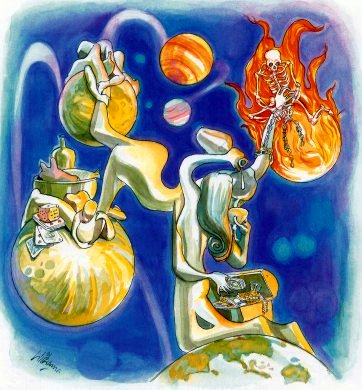Do not follow base desires,
nor live with heedlessness,
do not follow wrong beliefs
to grow in worldly ways.
Explanation: Stoop not to depraved ways, to practices that promote lower urges. Do not live slothfully. Do not associate yourself with those who hold false views.
The Story of a Young Monk (Verse 167)
While residing at the Jetavana Monastery, the Buddha spoke this verse, with reference to a young monk.
Once, a young monk accompanied an older monk to the house of Visakha. After taking rice gruel, the elder monk left for another place, leaving the young monk behind at the house of Visakha. The granddaughter of Visakha was filtering some water for the young monk, and when she saw her own reflection in the big water pot she smiled. Seeing her thus smiling, the young monk looked at her and he also smiled. When she saw the young monk looking at her and smiling at her, she lost her temper, and cried out angrily, “You, with a shaven head! Why are you smiling at me?” The young monk retorted, “You are a shaven head yourself: your mother and your father are also shaven heads!” Thus, they quarrelled, and the young girl went weeping to her grandmother. Visakha came and said to the young monk, “Please do not get angry with my grand-daughter. But, a monk does have his hair shaved, his finger nails and toe nails cut, and putting on a robe which is made up of cut pieces, he goes on alms-round with a bowl. What this young girl said was quite right.” The young monk replied, “It is true, but why should she abuse me on that account?” At this point, the elder monk returned: but both Visakha and the old monk failed to appease the young monk and the young girl who were quarrelling.
Soon after this, the Buddha arrived and learned about the quarrel. The Buddha knew that time was ripe for the young monk to attain sotapatti fruition. Then, in order to make the young monk more responsive to his words, he seemingly sided with him and said to Visakha, “Visakha, what reason is there for your grand-daughter to address my son as a shaven head just because he has his head shaven? After all, he had his head shaven to enter my order, didn’t he?” Hearing these words, the young monk went down on his knees, paid obeisance to the Buddha, and said, “Venerable! You alone understand me: neither my teacher nor the great donor of the monastery understands me.” The Buddha knew that the monk was then in a receptive mood and so he said, “To smile with sensual desire is not right and it is improper to have ignoble thoughts.” At the end of the discourse, the young monk attained sotapatti fruition.

